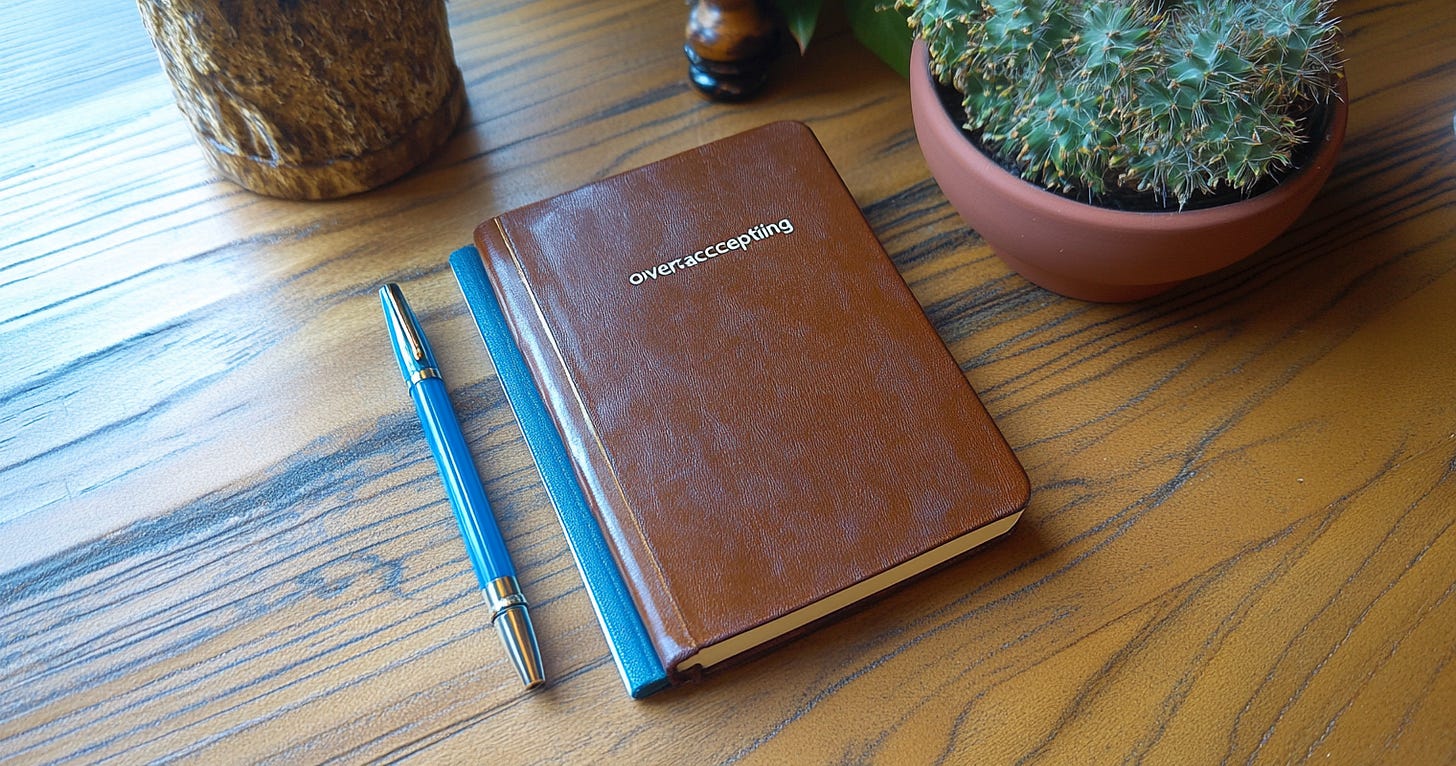🛠️Practicing Participatory Freedom: Overaccepting in Everyday Life
Binary Apocalypticism — the tendency to divide the world into rigid categories of good/evil, friend/enemy, us/them — is perhaps the most pervasive and destructive theological mutation we face today. It appears across the political spectrum and infects both personal and public discourse. But rather than simply identifying and critiquing this pattern, we need practical ways to respond that open space for genuine conversation and community formation.
Overaccepting offers exactly such a practice. This week, I'll guide you through specific ways to implement this transformative approach in various contexts of everyday life.
Daily Practice: The Overaccepting Journal
Materials needed: A notebook or digital journal
Time required: 10 minutes daily
Process:
Each evening, identify one interaction from your day that felt stuck in binary logic (where you or someone else fell into either/or thinking).
Record the interaction briefly, noting the binary options that seemed available.
Practice retrospective overaccepting by writing:
What you acknowledge as valuable in the other's position
What you might have added to create a third possibility
How the conversation might have unfolded differently
Over time, note patterns in the types of binary thinking you encounter most frequently.
This reflective practice helps train your mind to recognize binary patterns and imagine creative alternatives, making real-time overaccepting more natural over time.
Conversational Practice: The Third Way Question
Context: Use in conversations where binary options are being presented.
Examples:
When someone says: "You're either with us or against us."
When facing an apparent choice between total agreement or total rejection.
When someone presents only two possible interpretations of a situation.
Implementation:
Listen fully to the binary options being presented.
Acknowledge what's valuable in the perspective being offered.
Ask: "I wonder if there might be a third way we haven't considered yet?"
Follow with: "What if we could..." and offer a possibility that transcends the binary.
This question disrupts the binary framework without rejecting the person's concern, creating space for collaborative exploration.
Group Practice: Overaccepting Circle
Group size: 3-8 people
Time required: 45-60 minutes
Process:
One person presents a challenging binary they're facing (personal, theological, or political).
Moving clockwise, each participant practices overaccepting by:
Acknowledging what they find valuable in the binary presentation
Adding something that creates a third possibility
Passing to the next person without discussion
After the circle completes, open for general conversation about what new possibilities emerged.
Close by reflecting on how it felt to have your perspective overaccepted rather than simply agreed with or rejected.
This practice helps build a community capable of moving beyond polarized positions while honoring each person's contribution.
Scriptural Practice: Overaccepting with Jesus
Materials needed: Bible, journal
Time required: 20 minutes
Process:
Read one of the following passages where Jesus overaccepts a binary situation:
Matthew 22:15-22 (Paying taxes to Caesar)
John 8:1-11 (Woman caught in adultery)
Mark 3:1-6 (Healing on the Sabbath)
Luke 10:25-37 (Good Samaritan)
Identify the binary options Jesus was presented with.
Notice how Jesus acknowledges something from the original framework.
Examine how Jesus adds something that transforms the situation.
Reflect on what this reveals about God's character and how it might apply to situations in your own life.
This practice grounds overaccepting in Jesus's own ministry and helps us see it as a deeply Christian response to conflict.
Digital Practice: Online Overaccepting
Context: Social media interactions, comment sections, group texts
Implementation:
When encountering polarized online discussions, resist the urge to simply agree, disagree, or disengage.
Draft a response that:
Acknowledges the legitimate concern behind a post (even one you largely disagree with)
Adds a perspective that doesn't fit neatly into the existing frameworks
Asks a genuine question that invites further exploration
Before posting, review your response to ensure it creates space rather than closes it.
Be prepared to engage with responses or simply let your contribution stand without further debate.
This practice helps transform digital spaces from echo chambers or battlegrounds into potential sites for genuine conversation.
Family Practice: "Yes, And" Storytelling
Context: Family gatherings, dinner table, bedtime routine
Process:
Begin a collaborative story with a simple opening: "Once upon a time..."
Each family member adds to the story using the "Yes, and..." format
Encourage creative additions that take the story in unexpected directions
Reflect together on how accepting what came before while adding something new created a better story than any one person could have created alone
This playful practice helps family members of all ages internalize the basic pattern of overaccepting in a low-stakes, enjoyable context.
Remember: Progress, Not Perfection
Overaccepting is a skill developed through practice. You'll make mistakes. Some attempts will fall flat. But each effort helps develop the spiritual and intellectual muscles needed for this transformative approach.
Start with one practice this week. Notice what happens. Adjust as needed. The goal isn't perfect implementation but a gradual shift away from binary thinking toward a more generous, creative engagement with others—especially those with whom we most deeply disagree.
By cultivating these practices in our personal lives, we contribute to healing the dangerous polarization in our communities, churches, and nation. In this way, seemingly small daily acts become part of a larger movement toward participatory freedom.
This is part of our "Practicing Participatory Freedom" series where we explore practical applications of concepts from our weekly content. For a deeper exploration of overaccepting as a response to Binary Apocalypticism, see Monday's Overaccepting Dominative Christianism.



